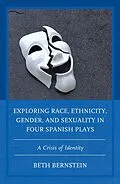Exploring Race, Ethnicity, Gender, and Sexuality in Four Spanish Plays explores society's influence on identity in Spanish theatrical works and discusses parallels to these works in contemporary popular culture. The Spanish plays El retablo de las maravillas (The Marvelous Puppet Show) by Miguel de Cervantes Saavedra (1615); Virtudes vencen señales (Virtues Overcome Signs) by Vélez de Guevara (1620); El público (The Audience) by Federico García Lorca (1929); and La llamada de Lauren (Lauren's Call) by Paloma Pedrero (1985) all deal with characters in the midst of a crisis of identity. Using an eclectic approach, supported by contemporary theories of race, ethnicity, gender, and sexuality, Beth Bernstein analyzes the four plays in terms of identity and shows how society imposes the construction of identity. As the characters reach to define themselves, internal and external pressures guide them in interpreting acceptable behavior. This book offers a close reading of the psychological struggle of the characters, driven by society to cover their differences with a symbolic mask which, if donned, will eventually devour their true identity.
Autorentext
Beth Ann Bernstein is senior lecturer of Spanish in the department of world languages and literatures at Texas State University.
Klappentext
Exploring Race, Ethnicity, Gender, and Sexuality in Four Spanish Plays explores society's influence on identity in Spanish theatrical works and discusses parallels to these works in contemporary popular culture. The Spanish plays El retablo de las maravillas (The Marvelous Puppet Show) by Miguel de Cervantes Saavedra (1615); Virtudes vencen señales (Virtues Overcome Signs) by Vélez de Guevara (1620); El público (The Audience) by Federico García Lorca (1929;, and La llamada de Lauren (Lauren's Call) by Paloma Pedrero (1985) all deal with characters in the midst of a crisis of identity. Using an eclectic approach, supported by contemporary theories of race, ethnicity, gender, and sexuality, Beth Bernstein analyzes the four plays in terms of identity and shows how society imposes the construction of identity. As the characters reach to define themselves, internal and external pressures guide them in interpreting acceptable behavior. This book offers a close reading of the psychological struggle of the characters, driven by society to cover their differences with a symbolic mask which, if donned, will eventually devour their true identity.
Inhalt
Introduction
Chapter 1: Marvelous Illusions: The Issue of pureza de sangre and Ethnic Identity in El retablo de las maravillas
Chapter 2: A Monstrous Problem: Examining Issues of Race in Virtudes vencen señales
Chapter 3: Struggling with the Mask of Conformity: Desire and Sexual Identity in El público
Chapter 4: Living Beyond the Binary: Questioning Socially Accepted Gender Roles in La llamada de Lauren
Conclusion: Shifting Identities in Four Spanish Plays and Parallels in Modern Popular Culture
